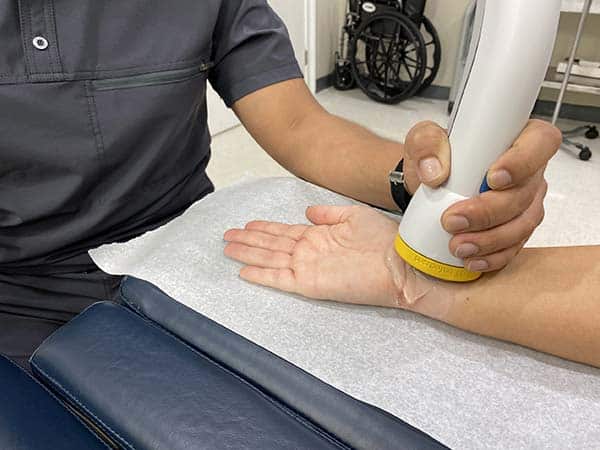
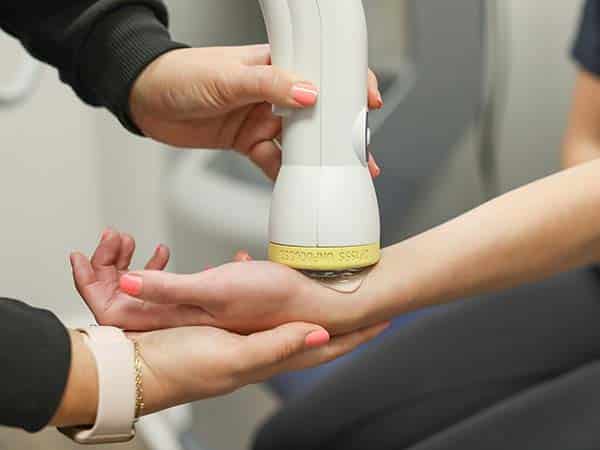
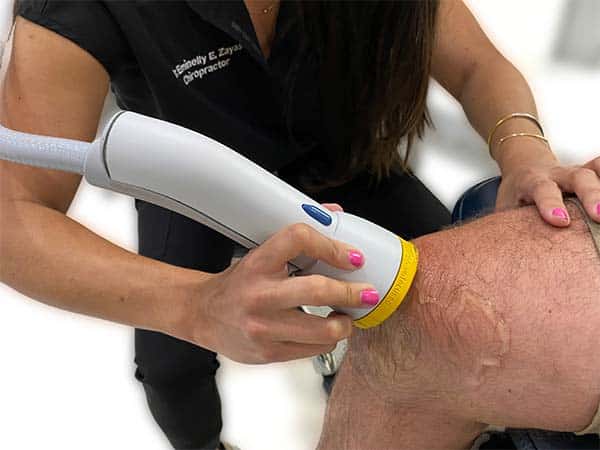
From serious sports injuries causing tissue damage to bone issues and stiffness that comes with age, living with pain is, well, a pain. But it's more than that - it's a stressful, often upsetting way to get through your day, month, and year. Have you ever tried to get out of bed with sore, stiff knees? Most folks would rather just get back in bed. Think you might try exercising with plantar fasciitis? Don't plan on running far or doing cardio for very long. Torn rotator cuff? Without proper treatment, your life might not ever be the same.
Living with pain and the inevitable issues that come with age can seriously affect your wellbeing and happiness. Sure, you could wake up every morning and rely on addicting medications to help you move. Or, you could risk further injury and damage with invasive surgeries that require long periods of recovery and downtime. But those can't be the only two options for treatment, can they?
Fortunately, a new, natural, non-invasive treatment for pain is revolutionizing the medical industry and transforming people's lives. It's giving athletes, average folks, and people of a certain age a reason to be hopeful. It's called Softwave therapy, and unlike many fly-by-night medications and sketchy treatments, it's backed by science and provided by Elite Healthcare Physical Medicine.
If you're barely making it through the day suffering from chronic pain, this FDA-approved drug-free treatment may be for you. Softwave therapy has already been used by thousands of people around the country living with issues like shoulder pain, knee pain, and plantar fasciitis. You could be next.
Though its popularity has only grown in recent years, Softwave therapy - also known as shockwave therapy - has been around for years. In fact, the first systematic study into the benefits of shockwave therapy took place way back in 1950. So, what is Softwave therapy?
Softwave therapy is a method of treatment that works incredibly well for mobility rehab, pain relief, and full-body recovery, usually from chronic pain or injuries. Softwave therapy uses a device emitting low-energy soundwaves that target a patient's injured area. These low-intensity waves boost blood flow and kickstart your body's natural healing processes, relieving long-term pain and helping your body to heal a wide range of injuries and conditions.
The main targets in the body include bones, tendons, and other soft tissues, which are encouraged to regenerate and repair via the shockwaves. Often, shockwave therapy is used in conjunction with other non-invasive treatments like chiropractic care, which we offer at Elite Healthcare Physical Medicine. The results are often incredible, leaving patients wondering why they never tried Softwave therapy before.
Softwave therapy works especially well for:

Better Blood Flow

Collagen Stimulation

Reducing Inflammation

Kickstarting cell growth and healing factors

Breaking down build-ups of calcium
With FDA clearance, little-to-no side effects, and quick application time, Softwave therapy is a welcome alternative for people suffering from pain. Who wants to spend weeks or months recovering from a surgery that might not even work? Likewise, who would want to become dependent on over-the-counter or, even worse, prescription pain meds? Living a life of addiction is a road nobody wants to go down.
Softwave therapy represents a revolution in non-invasive pain treatment; best of all, it's highly effective. Independent studies prove that shockwave therapy helps with pain. 65-91% of patients using shockwave therapy experienced real-deal improvements in damaged muscle and bone tissue, solving their mobility problems and drastically reducing pain. It almost sounds too good to be true, but as many patients at Elite Healthcare Physical Medicine will tell you - it isn't.
Book AppointmentSome of the most common conditions that Softwave therapy treats include:



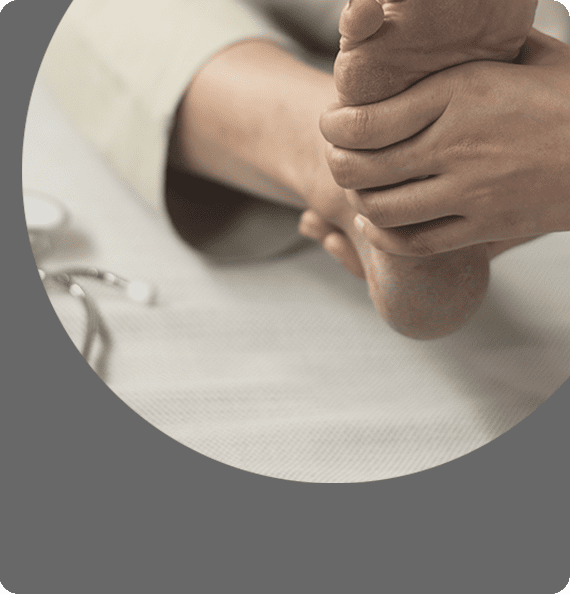




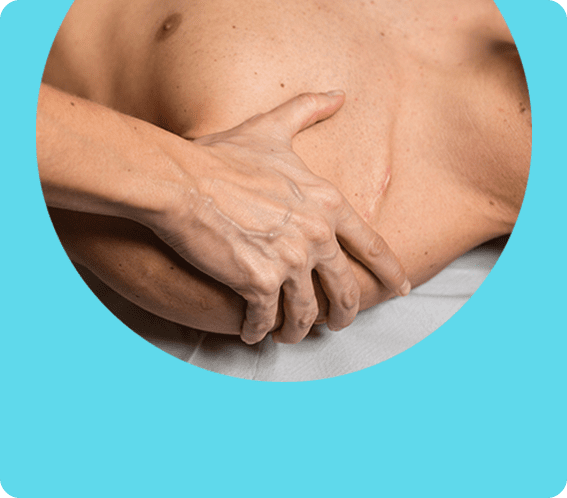
When you get up in the morning and go to the bathroom to brush your teeth, do you notice a stabbing, sharp pain near your heel? Does the pain go away once you have a chance to walk around? If so, you could have plantar fasciitis. According to the American College of Foot and Ankle Surgeons, this painful condition is quite common. About two million people suffer from plantar fasciitis every year, and almost 10% of all people will experience the condition at least once in their life.
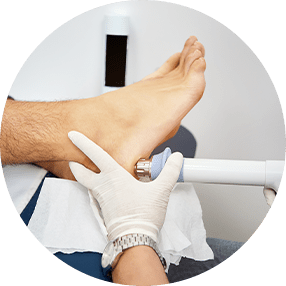
This common foot issue happens when the plantar fascia - a fan-shaped tissue near your heel - gets inflamed. The plantar fascia is a thick strip of connective tissue that links your toes to your heel bone, helping to preserve the arch of your foot. When this band is strained, it causes intensely sharp pain, usually in the morning when you wake up and plant your feet on the floor.
Most folks ignore plantar fasciitis because the pain eventually goes away throughout the day. However, if left untreated, plantar fasciitis can lead to weakness and chronic pain, which may affect daily walking.
Some causes of plantar fasciitis include:
The short answer to this question is not really. Patients with plantar fasciitis will ice the affected area with little-to-no relief since they spend so much time on their feet. It's hard to rest an achy heel if you've got a job that requires you to be on your feet. Anti-inflammatory meds like Advil don't work all that well, either. They may provide temporary pain relief, but in terms of a long-term solution, taking these drugs will cause major side effects.
Book AppointmentWhen more conservative treatment options like ice and over-the-counter meds don't work, most doctors turn to ultra-expensive orthotics, steroid injections, or invasive surgery. For the average person, those options fail on all fronts, as they carry risks for side effects and may even cause the issue to worsen.
Instead of going under the knife or changing their daily routines, many people suffering from plantar fasciitis are turning to Softwave therapy for relief.
During a shockwave therapy session, our expert providers use a special probe to deliver pressure waves to inflamed tissue. These waves trigger natural healing processes causing new blood vessels to form. In turn, oxygen is supplied to the affected area, reducing inflammation and causing healthy cells to regenerate. Shockwave therapy also produces collagen, which is crucial for connective tissue health.
With just a few visits, many patients find long-term relief from plantar fasciitis without relying on strange drugs or harmful surgeries.
Living with knee pain is just miserable. From knee tendonitis to osteoarthritis, knee pain can prevent you from enjoying activities and affect your day-to-day life. Your knee is a joint comprised of cartilage, bone, ligaments, and fluids. Tendons and muscles within the knee help the joint move. When one of these crucial knee structures is hurt or compromised, it results in knee pain and long-lasting knee problems. This, in turn, leads to difficulty walking at best and debilitating knee issues at worse.
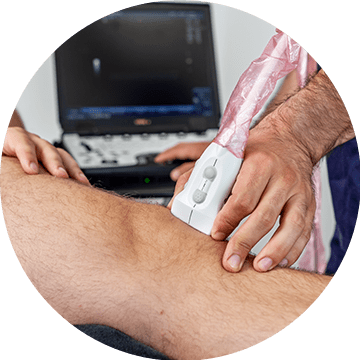

If you're an active person or somebody who plays sports often, you're probably all too familiar with knee pain - especially common conditions like patellar tendinopathy. Also called "jumpers knee," this issue happens at the patellar tendon, which is found on the front of the knee just under the knee cap. When living with this condition, most patients experience pain around the kneecap or lower down on the leg around the tibia.
In addition to injuries and issues like jumper's knee, everyday wear and tear will cause knee pain over time. With time, this knee pain can develop into arthritis. If your knees are swollen, painful, or stiff, you may have arthritis in your knees. Regardless of the kind of knee pain you're experiencing, treatment options have been limited to agonizing surgeries and addicting pain medications. But that all changes with shockwave therapy for knee pain in James Island, SC.

Though no two knee pain problems are exactly the same, shockwave therapy has been shown to be highly effective for knee pain. In fact, many patients at Elite Healthcare Physical Medicine find relief after just one session. Many times, sessions can be completed in as little as 30 minutes. So if you want to find relief for knee pain on your lunch break, that's definitely possible.
As is the case with plantar fasciitis, Softwave therapy works by sending sound wave and low-energy impulses to the affected area of your knee. These pulses stimulate your body's healing factors, which can help regenerate and repair damaged tendons and tissues. Softwave therapy for knee pain is especially promising for people who have tried other treatments - like surgery and pain meds - with disappointing results.
Benefits include:
Several studies and reviews prove that Softwave therapy can be very beneficial for people suffering from knee pain problems like jumper's knee. A study involving 66 patients with knee pain found that they enjoyed a significant improvement in their reported pain levels with Softwave therapy. In fact, knee pain was reduced by nearly 50% after a single month. When combined with other regenerative and physical therapy treatments at Elite Healthcare Physical Medicine, your days of living with knee pain are numbered.
Book AppointmentHere's a fact for you to consider: Every joint that you have in your body plays a part in your day-to-day life. But when we think of joint issues, we typically jump to knee issues. However, your knees aren't the only joints in your body to go through wear and tear. Your shoulders experience just as much, if not more, wear and tear than your knees. We put a strain on our shoulders just about every time we use or move our arms. Our shoulders play a pivotal part in living a normal life. When they begin to deteriorate over time due to age or overuse, it creates a litany of painful problems.
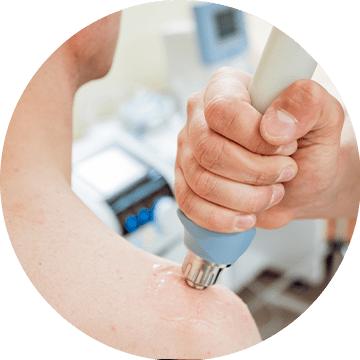

There are many causes of shoulder pain, like deterioration, inflammation, and trauma. Of the many painful shoulder conditions affecting Americans yearly, rotator cuff tendonitis and arthritis are very common. Also called calcific tendinitis, rotator cuff pain is caused by built-up calcium deposits on the shoulder's tendons, which connect your rotator cuff to nearby muscles and bones. This painful condition is usually linked to sports, like basketball and volleyball, or in professions requiring repetitive movements, like in the plumbing industry.
Some common symptoms of shoulder pain and rotator cuff tendinitis include:
Though strengthening exercises and some medications provide temporary relief for shoulder pain, they're not meant as long-term solutions. Luckily, Softwave therapy for rotator cuff pain in James Island, SC, can help.
Shockwave therapy has been shown to work wonders for shoulder pain. Low-intensity shockwaves break up calcium deposits and jumpstart your body's healing processes, stimulating blood flow and healthy cell growth. Shockwave treatment is especially effective for long-term shoulder pain since it releases stem cells, sends growth factors to the affected area, and boosts capillary production. Shockwave therapy has also been shown to break down scar tissue and eliminate trigger points, all of which decrease shoulder pain. This relief is most often long-lasting, unlike other treatments like medications and injections.
Many studies support the efficacy of Softwave therapy for shoulder conditions like rotator cuff pain and calcific tendonitis of the shoulder. In a study of 84 patients living with long-term rotator cuff tendonitis, participants in the treatment group saw a significant decrease in the intensity of their shoulder pain. Another study related to shockwave therapy for calcific tendonitis found that 86.6% of patients experienced fewer calcifications.
If you're having to live with rotator cuff pain or another type of shoulder issue, choosing Softwave therapy may be your best course of action.
Book AppointmentWhether you're sick of living with intense heel pain from plantar fasciitis, the mobility issues associated with knee pain, or the day-to-day struggles of rotator cuff degeneration, you'll find hope at Elite Healthcare Physical Medicine. Unlike some medical clinics, our team of doctors and specialists focus on an integrative, multidisciplinary approach to healing. Instead of relying on addictive medications and invasive surgeries, we prefer to address the underlying causes that our patients face.
We combine several all-natural pain relief therapies so that your shoulder pain, knee pain, joint pain, and foot pain go away for good. We resolve pain by using healing treatments that restore function and improve mobility for the long term. Our state-of-the-art regenerative medicine treatments, used hand-in-hand with proven chiropractic techniques, will stimulate your body's healing power from within. If your pain is related to muscles, nerves, and bones, our doctors can help you overcome discomfort, injury, or medical conditions affecting these systems.
If you've been unable to resolve your pain or have become dependent on painkillers to cope, Softwave therapy may be the natural solution you need. It all starts with a quick call to our office, so we can begin to understand your needs. When you come for your first visit, our doctors will find the personalized treatment you need so that you can manage your pain in a non-invasive and drug-free environment manner.
Book AppointmentJAMES ISLAND, S.C. (WCSC) - Ditches running through a James Island neighborhood are still holding several inches of water from Monday’s storm, frustrating some residents who say they don’t know who is responsible for maintaining the ditches.Kat Skover lives on James Island in a neighborhood near the intersection of Folly and Fort Johnson Roads.She says the standing water attracts flies and mosquitos and impacts her ability to play outside with her daughter.“We got the house so that we could be in the ba...
JAMES ISLAND, S.C. (WCSC) - Ditches running through a James Island neighborhood are still holding several inches of water from Monday’s storm, frustrating some residents who say they don’t know who is responsible for maintaining the ditches.
Kat Skover lives on James Island in a neighborhood near the intersection of Folly and Fort Johnson Roads.
She says the standing water attracts flies and mosquitos and impacts her ability to play outside with her daughter.
“We got the house so that we could be in the backyard and hang out outside but with the difficulty of all the drainage and the water it can be really difficult to keep the yard in a state that is enjoyable,” she says.
The water can also affect the safety of the roadways, she says.
“Some streets will even have water on the street for a day or two following a heavy rain,” she says.
Her neighbor, Nicholas Connolly, says the ditches fill up fast during a storm and will stay filled for days.
“The ground is really soft, and if you walk around your feet will sink into your yard,” he says. “I’ve not once seen the city come and redo the ditches.”
Skover says she’s called the James Island Public Service District for help but got waitlisted.
“We’re on a schedule we’ve heard of, but that was several months ago,” she says.
The neighborhood sits in the jurisdiction of the Town of James Island.
James Island Mayor Brook Lyon says the problem is typically caused by clogged pipes under driveways. If the town is alerted of a drainage problem, they’ll come clean it out with a shovel, she says.
If it’s packed too hard or the driveway is too wide, they’ll call Charleston County or the South Carolina Department of Transportation for help with a vacuum truck.
The town doesn’t have any record of drainage complaints from the neighborhood, according to Lyon.
She encourages anyone with an issue to file a complaint on the Town’s website under the “MyTOJI” tab, or by calling Town Hall at 843-795-4141.
Copyright 2024 WCSC. All rights reserved.
JAMES ISLAND, S.C. (WCSC) - For four years, folks have flocked to an event known fondly as the Black History Soul Meet & Eat whose organizers say if you’re gonna be meeting, you may as well be eating.This year, the event takes place Saturday at the James Island Arts and Cultural Center, along Camp Road.Much like in years past it’s not only a celebration of how much you can eat or who you can meet, but also what you can learn along the way.“It says ‘eat’ and, of course, it says ‘mee...
JAMES ISLAND, S.C. (WCSC) - For four years, folks have flocked to an event known fondly as the Black History Soul Meet & Eat whose organizers say if you’re gonna be meeting, you may as well be eating.
This year, the event takes place Saturday at the James Island Arts and Cultural Center, along Camp Road.
Much like in years past it’s not only a celebration of how much you can eat or who you can meet, but also what you can learn along the way.
“It says ‘eat’ and, of course, it says ‘meet’ and with the meeting aspect we have networking so you can network with any business owners there and any of the vendors, yes, we will have vendors as well as the people that come from the community for this event,” Krystal Yeadon, the founder and CEO of Krystal Klear Productions, said. “We have to eat that good soul food, that Gullah-Geechee food. That’s just what it’s all about along with plenty of educational activities where you learn about different African Americans and their contributions to society.”
The event runs from noon to 4 p.m. Tickets cost $11 in advance online and $15 at the door for adults and $6 for children. You can add on an entry to a Black History Basket giveaway when buying tickets for $1.50.
Tickets can be purchased here.
Yeadon says the fee helps fund some of the artists who attend the event, like the Speak Freely Foundation, which specializes in poetry. Yeadon says the group combines poetry and boxing while mentoring area youth. But Yeadon says what they’ll do at Black History Soul Meet & Eat is provide “poetic vibes.”
“I like to give back to Black-founded, Black-owned, nonprofit organizations,” Yeadon said. “It’s my way of giving back and the Speak Freely Foundation is special to me because when we did this event for the first year in 2019, we gave back to them as well. So now they’re coming back around and we’ll be giving back to them again. They do a Speak Freely Foundation Poetry Festival every year and I actually organized that festival as well. So that is our “give-back” organization this year. We’re giving back to the youth, I love the youth and I love the arts.”
Along with food, networking opportunities, live poetry, and opportunities to learn about black history, Yeadon says there will also be live music.
“We have a bunch of artists. That’s the main portion of it,” Yeadon said. “These artists are all performing artists and some are actually visual artists as well. There are probably gonna be some other surprises for everyone, probably even some for me, but whatever it is - it’s going to be soulful.”
Copyright 2024 WCSC. All rights reserved.
JAMES ISLAND, S.C. (WCSC) - The sanctuary of a Baptist church nearly destroyed in a devastating fire will finally reopen this weekend two and a half years after it was struck by lightning and went up in flames.The fire happened at Fort Johnson Baptist Church on Camp Road on James Island on Sept. 9, 2021.“Remembering this date and everything that comes from that, I think it speaks to God’s faithfulness since then,” Marty Middleton, the pastor of Fort Johnson Baptist Church, says.The fire started in the s...
JAMES ISLAND, S.C. (WCSC) - The sanctuary of a Baptist church nearly destroyed in a devastating fire will finally reopen this weekend two and a half years after it was struck by lightning and went up in flames.
The fire happened at Fort Johnson Baptist Church on Camp Road on James Island on Sept. 9, 2021.
“Remembering this date and everything that comes from that, I think it speaks to God’s faithfulness since then,” Marty Middleton, the pastor of Fort Johnson Baptist Church, says.
The fire started in the steeple after it was struck by lightning. The wood smoldered for hours until the entire sanctuary was engulfed in flames and thick, dark smoke billowed through the air.
“The ceiling had collapsed, and the steeple was laying inside of it,” Middleton says. “It was pouring down rain that day. [It was] just a really dark and depressing day.”
That day is now behind them, and after years of work, $5.4 million spent and lots of prayers, the doors of the sanctuary will reopen for Sunday service at 10:30 a.m. on March 17.
“It was the community, it was the people, that made it happen,” Venessa Dennis, a member of the church, says. “It’s been an adventure. It’s been hard, but great stuff comes out of a struggle.”
The damage from the fire, smoke and water from fire hoses forced the church to tear the sanctuary walls down to just cinderblocks. Now, new chairs fill the room, new instruments sit on the stage and new carpet, paint and lights decorate the space.
“We’ll have one unified sound system that’s state of the art and sounds amazing,” Middleton says.
While insurance covered a portion of the rebuild, church leaders say donations from the community played a major part in funding the new sanctuary.
“Getting to see the look on people’s faces on Sunday morning is going to be super exciting,” worship leader Landed Allen says.
The church never missed a Sunday service, even immediately after the fire, Middleton says. They have been operating out of another building, but he and the congregation are overjoyed to return to the sanctuary in just a few days.
“It brings a sense of excitement and anticipation for seeing what God has done over the past two years and only continues that exponentially better,” Middleton says.
If you would like to learn more information about the renovation or to donate, click here.
Copyright 2024 WCSC. All rights reserved.
More than 1,100 residents have signed a change.org petition asking the town of James Island and the PSD to leave this property as undeveloped green space, possibly a scenic, wooded town park with walking trails, picnic areas and maybe a dog park. The town has expressed its support for such a deal, but the district has not, at least not yet.The property's location — close to a scenic boardwalk overlooking Simpson Creek, James Island Town Hall and the new Arts and Cul...
More than 1,100 residents have signed a change.org petition asking the town of James Island and the PSD to leave this property as undeveloped green space, possibly a scenic, wooded town park with walking trails, picnic areas and maybe a dog park. The town has expressed its support for such a deal, but the district has not, at least not yet.
The property's location — close to a scenic boardwalk overlooking Simpson Creek, James Island Town Hall and the new Arts and Cultural Center — is well-suited for a park.
The first town of James Island purchased the property with public money to build a Town Hall, but the court conveyed most of this parcel to the Public Service District in 1997, after the first town was dissolved. In 2004, an adjacent piece of land previously conveyed to the Honeyhill Neighborhood Association was also transferred to the district, per the terms of the original court order. In March 2023, the district entered a 12-month contract with KT properties to purchase the site for $1.89 million.
The developer originally proposed a planned development called Marsh Walk Village, with 20 townhomes, a large shopping center and a parking lot. The plan involved removing 19 grand trees and dozens of unprotected trees. The accompanying stormwater management plan has been a serious concern for residents near the property, as they suffer frequent flooding. During several public meetings last year, residents from the adjacent neighborhood of Whitehouse Plantation and beyond spoke out against the rezoning. James Island Town Council voted down the Marsh Walk Village development plan in October.
The Public Service District has since extended the developer's contract, and the developer is seeking to move forward with two plans to develop the property under its current zoning, which would allow a 50,000-square-foot, 3-story storage facility and 12 single-family homes. But these plans are just as environmentally destructive. James Island is an urban Sea Island, and urban forests like the one on Dills Bluff Road are critical to managing stormwater.
Charleston County has lost more than 10,000 acres of tree cover since 1992; that's an area larger than the Charleston peninsula and Daniel Island combined. New stormwater ponds and other features cannot fully replicate the absorption ability of a naturally vegetated and wooded area. A 2019 study of 12 cities, including Charleston, showed that runoff increases when forested land is converted to impervious surfaces.
If the proposed project is developed, the retention ponds will not adequately manage the stormwater runoff, and that water will have to go somewhere. And where it will go is to the existing homes behind the proposed retention ponds and Dills Bluff Road. This will have a devastating impact on Whitehouse Plantation homeowners, and Simpson Creek will likely be impacted, too.
It would be incredibly shortsighted for the PSD to effectively sell out the residents of James Island; and it would be unwise to sell this land to a developer to build 10 to 12 homes and a massive self-storage facility that is nothing more than another asset for an investment firm's real estate investment portfolio.
The James Island PSD should terminate its contract with the developer and allow the town and the residents of James Island to purchase the land, possibly with county greenbelt funds, and turn it into a park.
Casey Buchanan is a James Island resident.
The no-frills food chain filed plans with the city of Charleston recently to take over part of the space once occupied by the now-defunct Bi-Lo supermarket on Folly Road on James Island.Aldi plans to lease 22,000 square feet of the roughly 40,000 square feet of empty space in the former grocery store building, according to Mark Hoffman, director of development for New Jersey-based Garden Communities, which has owned the 4.5-acre retail center since 1994....
The no-frills food chain filed plans with the city of Charleston recently to take over part of the space once occupied by the now-defunct Bi-Lo supermarket on Folly Road on James Island.
Aldi plans to lease 22,000 square feet of the roughly 40,000 square feet of empty space in the former grocery store building, according to Mark Hoffman, director of development for New Jersey-based Garden Communities, which has owned the 4.5-acre retail center since 1994.
An Aldi representative did not immediately respond for comment on projected time frames for the renovation work and an opening date. Hoffman said he expects work to begin within the next six months with a possible opening by 2025 "if not earlier."
Last year, workout chain Planet Fitness leased and renovated 25,000 square feet on the east side of the former supermarket.
It’s the second new site in the works this year for the German-owned grocery chain in the Charleston area.
In May, the company leased several acres at U.S. Highway 17 and KOA Campground Road for a second Mount Pleasant location. Aldi signed a land lease with property owner Oakland Associates LP for 20 years with the option to renew up to 25 years.
The penny-pinching Aldi doesn’t provide free shopping bags and requires a refundable quarter deposit for a shopping cart.
The chain stocks a variety of standard products, mostly under its own label, as well as fresh meats and produce.
The grocer launched its first store in the Charleston region in 2015 off Dorchester Road on the edge of Summerville and North Charleston. The company then followed with a second store on Johnnie Dodds Boulevard in Mount Pleasant in 2017. Both locations were former bowling alley sites.
Aldi opened its third Lowcountry location in 2020 on North Main Street in Summerville, just south of the Earth Fare supermarket. The company added a fourth site later that year in the former Barnes & Noble Booksellers space on Rivers Avenue in North Charleston. A fifth store opened in 2022 on St. James Avenue in Goose Creek.
The low-budget grocer, with its U.S. headquarters in Batavia, Ill., is one of America’s fastest-growing retailers. It will add 120 stores this year. By the end of 2023, it will have 2,400 locations across the nation. It has 48 stores in South Carolina.
Lidl, its competitor that is also based in Germany, opened its first Charleston-area location on St. James Avenue in Goose Creek in 2017. A second location opened in 2022 in Cedar Grove Shopping Center on Dorchester Road in North Charleston, east of the Aldi location.
Lidl signed a lease in 2021 to outfit a former kitchenware shop in Bowman Place Shopping Center on Bowman Road in Mount Pleasant for the region’s third location but later scuttled plans.
In September, specialty grocery chain The Fresh Market took over the lease from Lidl. The Greensboro, N.C.-based supermarket chain has submitted plans to the town, but it has not announced an opening time frame.
